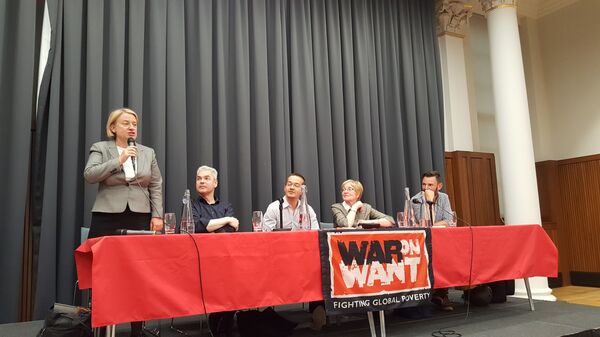CETA which stands for the Comprehensive Economic and Trade Agreement is a dry run for TTIP.
It represents a 'new generation' of trade treaties on behalf of big business (TISA, TPP) that are set to undermine democracy and destroy basic rights of workers and consumers.
Negotiations on CETA started back in 2009, and concluded with a ceremony in Ottawa in September 2014. A number of EU governments were unhappy with the final text agreed by the negotiators, but it was rushed through regardless. No MPs or MEPs were allowed to take part in the talks, which were conducted in secret, and no one was given access to the text of the agreement until it was too late. Key elements of Europe's public services have been bargained away without a shred of public debate, says War on Want, who is coordinating the collection of signatures of Europeans against CETA in the UK.
#stopCETA #NoTTIP @WarOnWant @GlobalJusticeUK @CouncilofCDN @GreenJeanMEP are all saying — stop these trade deals! pic.twitter.com/pHoFE2lQDL
— War on Want (@WarOnWant) May 16, 2016
War on Want's Executive Director John Hilary, one of the seven members of the European Citizens' Committee, told Sputnik that even leaving the EU won't free the UK from the shackles of CETA.
"We are not campaigning for 'in' or 'out'. We need to put some information out for people because 99.9 percent of UK's population have never had a direct experience of the EU institutions," Hilary told Sputnik.
People arguing for 'in' say they recognize that TTIP and CETA are absolutely rubbish. Those who argue for 'out" say if you like TTIP then stay 'in' because you'll get more of it.
"If we vote to come out of EU TTIP won't apply to UK, but CETA probably will. And the sunset clause on ISDS says it will still have jurisdiction over UK for 3 years after leaving," Hilary added.
CETA, like TTIP and other such "new" deals, includes the infamous Investor-State Dispute Settlement (ISDS) mechanism, which allows companies to sue governments over any new law or policy that might reduce their profits in the future.
As @MaudeBarlow of @CouncilofCDNs says #stopCETA It's bad for Canada & it WILL be bad for the UK too pic.twitter.com/JSer4JKlbV
— War on Want (@WarOnWant) May 16, 2016
In a public consultation held in Europe, over 97 percent of respondents rejected the introduction of these new powers for business. Yet the EU has gone ahead with it anyway, and CETA will introduce ISDS not only for Canadian companies but also for any US firms with offices in Canada (and that's about 85 percent of all US companies).
#CETA is opposed, like #TTIP by hundreds of thousands-both sides of Atlantic says @mark_dearn. Toxic trade deals pic.twitter.com/jE5fEfDar7
— War on Want (@WarOnWant) May 16, 2016
Official statistics show that 60 percent of all lawsuits against governments have been won by corporations. In one of the latest examples, Slovakia, not a rich country by any standard, lost 29.5 million Euros to a Dutch health insurance company that challenged the nationalization of Slovakia's health system — an election promise by the national government. And in Canada, a fracking company is suing the government for 250 million for a ban on fracking even though it has not done any fracking yet. This has become possible because the ISDS system allows investors to sue governments for "lost future" profit.
Anti #CETA song at the event by @WarOnWant in London pic.twitter.com/ALXz0z2wRr
— Sputnik UK (@SputnikNewsUK) May 17, 2016
But a financial loss may be nothing compared with consequencies for the environment. In Germany when the government faced an ISDS case brought by Swedish energy multinational Vattenfall, it settled by getting the city of Hamburg to lower the environmental standards for a planned coal-fired power plant.
Ironically, legal action is now being brought against the German government by the EU Commission for not sufficiently protecting the Elbe River that surrounds the plant.
In Canada, tar sands oil producers, having been hit with a ban by the Obama administration on imports of their highly toxic substance, are now looking forward to sending it to Europe once CETA is done and dusted.
"Canada wants to replace Russia as a source of energy for Europe, but its tar oil is extremely dirty. Its extraction needs a lot of water with chemicals and there are now huge toxic lakes in Canada, while the boreal forests are burning because all the water has been drained from underneath them. If you want more energy like that, you will have more and more of a climate catastrophe," Maude Barlow, the Council of Canadians chairperson said.
CETA is now ready for ratification on both sides of the Atlantic — a lengthy procedure which requires the entire text to go through a process of 'legal scrubbing' and to be translated into all the official languages of the EU. It will now be presented to the EU Council of Ministers (representing the governments of all 28 member states) and also to the European Parliament. This part of the process is due to begin later in 2016.
If CETA is considered to be a 'mixed' agreement within the EU — meaning that it is not just a matter for the European institutions alone — it must also be presented to the national parliaments of all 28 member states for them to ratify in turn. This will take many more years and could well see the deal rejected. However, the EU does not have to wait for the full ratification process to be completed: under the EU's anti-democratic procedures, it can apply the content of CETA on a provisional basis already, without worrying about any accountability to the people of Europe.
TTIP has been mentioned in a lot in debates about Brexit.

Natalie Bennett, the UK Green Party leader who has just stepped down told Sputnik:
"People tweet me to say that we need Brexit because of TTIP. But there's a lot more oppostition to TTIP and CETA in Europe than in Britain.
"3.5 million across Europe signed a petition against TTIP and 250 thousand marched in the streets of Berlin. The EU civil society is much stronger and we are better relying on them than going it alone. Just imagine PM Boris Johnson going to Washington to beg President Trump to sign a trade deal with Britain because it had left the EU. What kind of deal that would be?" the former Green Party leader told Sputnik.
That is why campaigners urge the Europeans to kill CETA now, before it is too late.
"Our union just like all major unions has registered with the Remain campaign. But I don't see a contradiction to our opposition to TTIP and CETA," Nick Crook of Unison told Sputnik.
"The European Citizens' Initiative on TTIP and CETA launched in Brussels two years ago calls for an end to negotiations on both the EU-US and EU-Canada trade talks (TTIP and CETA, respectively) and demands instead a new approach to EU trade policy that puts people and the planet before corporate profit. In order to be successful, the initiative needs to collect at least one million signatures from across the EU in the space of a year."


